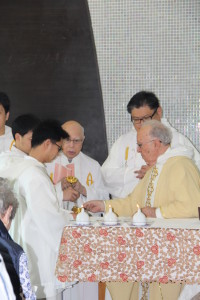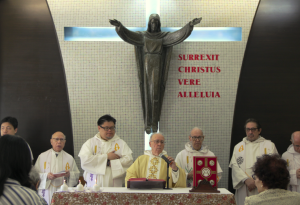Easter Sunday! It is the greatest feast for Christians, for us! St. Paul tells us that if Jesus had not risen, our faith would be in vain, and our hope – and heaven. God indeed raised Jesus from the dead. Hence, our faith in him, our hope in our resurrection is true. Easter is pascha, or passage from death to life, from Good Friday to Easter Sunday. The Easter candle tells us that Jesus is raised and lives and that He is our light and life! Indeed, we are Easter people.
Let us meditate briefly on the message from the Word we have just proclaimed.
First Reading: Acts 10:34, 37-43. Peter proclaims the central content of apostolic preaching: the Jesus event. He died, rose from the dead and lives. Therefore the disciples of Christ – like Peter and the other apostles – have to be witnesses of the resurrection of Christ.
Second Reading: Col 3:1-9. Paul tells us that in Christ, we are raised. Look therefore for the values above, that is, the values of the Kingdom of God. Not to escape from the world, but to transform the world with the values of equality, justice, solidarity, prayer, compassion, forgiveness. As raised in Christ, we have to try always to be dead to sin and alive in love for God in Jesus Christ.
The Holy Gospel: Jn 20:1-9. John’s narrative of the empty tomb: Mary Magdalene was the first to see it, and afterwards Peter and John. John saw and believed: his great love gave him a deeper way of knowing, as it is clear also in the life of the mystics; the beloved disciple was the first to believe in the resurrection of Jesus. The tomb where Christ was buried is empty; He is not there. (Parenthesis – It was said then that a friend asked Joseph of Arimathea: Why did you give your great and beautiful tomb to someone else to be buried in your tomb?†Joseph of Arimathea answered: “Oh, he asked me if he could use it for the weekend!â€) On the third day, the Lord was not there: the tomb was empty. For those who believe and love – like for John the Evangelist – the empty tomb is an argument for the resurrection of Christ. Other arguments of faith are the appearances of Jesus to the disciples. The apostles reluctantly accepted first, and little by little, the resurrection of Christ: that the Risen Lord was the same crucified Lord – gloriously different but the same Jesus. Afterwards, they incredibly lived their faith in the resurrection powerfully and joyfully. The change that took place in the apostles is an argument of faith to believe in the resurrection: before Easter, they were afraid and sad; after Easter, they are courageous and joyful in proclaiming the death and resurrection of Christ – and in suffering and dying for their faith in him.
For each one of us, the reason for our belief in the resurrection of Christ is our faith, God’s great gift to us.
Following the apostles and first disciples of Jesus, we believe in Christ’s resurrection: it is the core of our faith. Remember the Gospel I preach, St. Paul tells Timothy, “Jesus Christ risen from the dead†(2 Tim 2:8). We are asked by our faith in Jesus to be witnesses of his resurrection.
To be witnesses of the resurrection, to be able to say “I have seen the Lord,†is to have experienced an encounter with the Risen Lord. Our faith is not a doctrine or a morality but the paschal experience. How did the first Christian communities experience the Risen Lord’s transforming presence? “They remained faithful to the teaching of the apostles, to fraternity, to the breaking of the bread, and to prayer. They shared their food gladly and generously, praised God and were looked up by everyone†(Acts 2:42, 46-47).
Where may we encounter the Risen Lord today? The encounter of faith with Jesus may take place in our community prayer: “Where two or three gather in my name, there I am in their midst†(Mt 18:19-20). We may experience the Risen Lord in God’s Word, the Sacred Scriptures, especially when proclaimed in the Church, the community of disciples. We can experience Jesus in the breaking of the Bread, like the disciples to Emmaus (Lk 24:32). We may encounter Jesus, moreover, when we feed him in the poor, heal the wounded on the road of our life (cf. Mt c. 25). Radically, we encounter the Risen Lord in the practice of love of neighbor: “We are well aware that we have passed over from death to life because we love our brothers†(1 Jn 3:14).
One encounter with the Risen Lord leads us necessarily to the others. The different encounters call and fertilize each other, and aid us to grow in union with the Risen Lord.
We believe in Christ’s Resurrection. We have been preparing through Lent and especially in Holy Week for this day: Easter Vigil/Sunday. I ask myself: Do I have a strong desire and hope to be raised by God in Jesus and the joy to live as witness of the Crucified and Risen Lord? Someone says that we shall have as much resurrection as death – death to our old self of sin and darkness and un-love, and resurrection to life and love and forgiveness and compassion.
It has been said that “The statement ‘Jesus is risen’ is only fully true when, saying it, it revolutionizes my personal life.â€Â We hope and pray that our faith in Jesus’ resurrection does change our life a bit. Our faith in Christ’s resurrection, and therefore in ours, too (2 Cor 6:14); our faith in Christ’s resurrection grows little by little, like the grass in the field, like a tree: through an act of kindness, a greeting smile, a silent presence, a gesture of loving concern, a prayer of petition.
A friend sent to me the following text, which I wish to share with you:
I know that Christ is risen…
- Because I have experienced forgiveness.
- Because He has placed in my heart a fountain of joy that no one can take away.
- Because I feel a great love for my brothers and sisters.
- Because I notice that the flower of hope is always fresh.
- Because He takes away my fears and I never feel alone.
Indeed, Christ is risen and will always be with us. We hope and pray that you and I see him through this Easter season in a clearer manner. My brothers and sisters: may we all have a Happy Easter, and may those around us notice it by the way we treat them with simple kindness and joyful compassion. Let us never be afraid. Let us be joyful. How wonderful to be able to shout:
We are Easter people and Alleluia is our song. Alleluia, that is, praise the Lord!
 
Fausto Gómez, OP
St. Dominic’s Priory
Macau, April 5, 2015


